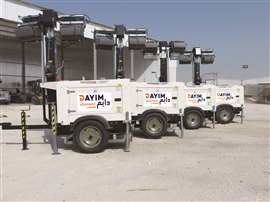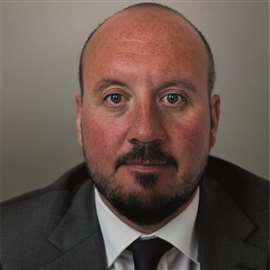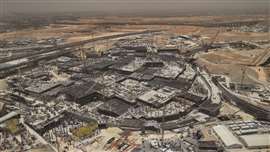A wave of giga-projects across the Gulf—most notably in Saudi Arabia—is triggering unprecedented demand for construction equipment rentals, as regional governments push ahead with large-scale infrastructure schemes to diversify their economies and accommodate rapid population growth.
In 2024 alone, Saudi Arabia awarded an estimated $148bn in construction contracts, the highest annual figure ever recorded by a Gulf Cooperation Council (GCC) member, according to industry analysts. These included a US$4.7 billion deal with Webuild to construct an artificial lake at NEOM and a US$1.92 billion contract awarded to Saudi Binladen Group to resume work on the Jeddah Tower.
“The demand for rental equipment across the Middle East is huge—so much so that the supply chain cannot keep up, whether for products, people or anything else,” says Paul Rankin, managing director of Nationwide Platforms and chief operating officer of Loxam’s Powered Access Division.
Rankin pointed to NEOM, the Red Sea Project and Diriyah Gate as emblematic of a broader uptick in activity across the region, with construction and hydrocarbons forming the backbone of demand.
Keeping up with demand
“There are two main sectors which are the backbone of the Middle East,” he says. “Firstly, construction, where the demand for equipment is enormous due to poor existing infrastructure and a growing population. Secondly, oil and gas—approximately 17 million barrels of oil are pumped each day across the region, and gas plays an especially significant role in Qatar.”
Tourism and aviation are further fuelling growth, buoyed by a youthful demographic and a surge in international events—from global expos to major sporting tournaments.
Rankin, who has been active in the region since 2004, has seen successive booms and busts, including the post-2008 construction slump and the volatility surrounding oil prices in 2016. While these cycles exposed supply chain fragilities and occasionally pushed customers toward equipment ownership, the current expansion appears different in scale and ambition.
“The region was not fully prepared for global events such as the 2022 FIFA World Cup or the upcoming 2029 Asian Winter Games,” Rankin notes. “But the long tail of such initiatives means demand for rental equipment in the region will be there for years and years to come.”
 Equipment at Dayim. Photo: Dayim
Equipment at Dayim. Photo: Dayim
The effects are already reshaping the equipment rental market. Saudi-based Dayim Rentals has expanded its fleet with electric scissor lifts, low-emission generators and high-capacity forklifts, while also investing in telematics systems for fleet tracking and predictive maintenance.
“Telehandlers, boom lifts, generators, lighting towers and air compressors are currently the most requested,” a company spokesperson says. “The demand for material handling and access solutions has risen sharply due to complex site requirements and evolving safety standards.”
The diversity of ongoing work—from site preparation and drainage to modular utilities—has broadened demand across sectors. UK-headquartered pump specialist Andrews Sykes, active in six GCC markets, reported strong momentum, particularly in the UAE and Saudi Arabia.
“In the UAE, ongoing infrastructure upgrades, real estate developments and the push for smart cities are driving consistent equipment requirements,” says Tom Lane, the company’s general manager for the Middle East. “Meanwhile, in Saudi Arabia, Vision 2030 projects are creating massive opportunities in construction, energy and utilities.”
Rental, Lane says, is becoming the preferred model due to its inherent flexibility and scalability. The company has adapted its offering to regional conditions, deploying sand-resistant dewatering pumps in Saudi Arabia and low-noise HVAC systems for urban UAE environments.
Rental challenges
“Regulations can vary significantly between the UAE, Saudi Arabia and other Gulf markets,” he adds. “We mitigate these challenges through proactive compliance, a strong local presence and by maintaining a fleet that meets—or exceeds—the most stringent requirements.”
Sustainability pressures are also rising. While environmental standards remain uneven across the GCC, rental providers are under growing pressure to offer low-carbon alternatives.
“In the UAE, where government initiatives and sustainability targets are more advanced, we’re already deploying electric submersible pumps and hybrid equipment,” Lane says. “In Saudi Arabia, interest is building, especially among international contractors who are implementing global ESG standards.”
Dayim echoed this shift, particularly in regulated sectors. “Interest in electric and low-emission equipment is growing,” a spokesperson says. “Clients are beginning to request greener alternatives, and we are adapting our offerings accordingly.”
 Tom Lane, general manager Middle East at Andrew Sykes. Photo: Andrew Sykes
Tom Lane, general manager Middle East at Andrew Sykes. Photo: Andrew Sykes
Still, Rankin cautioned that genuine market-wide demand for sustainability is in its early stages. “The countries are very clear on their environmental policies, but actual demand today is limited. I expect that to change in the next one to three years as these policies move from ambition to implementation.”
Multinational firms, especially in transport, are beginning to lead the way. “Aviation and maritime, which historically had significant environmental footprints, are now serious about reversing that trend and reaching net zero,” Rankin says. “These sectors can drive the agenda.”
Despite regulatory complexity across the region, Rankin believes the overall business environment remains relatively navigable. “The GCC is quite good from the perspective of ease of doing business,” he says. “There are small nuances in moving machines across countries, but the regulatory environment isn’t the main challenge.”
Instead, he points to safety standards as a more pressing concern. “Not all customers maintain the high safety standards that larger global businesses demand,” he says. “There is a lot of catching up to be done.”
Nationwide Platforms has responded with its own safety innovations for working at height, incorporating them into regional fleets. “Not every rental company is like us,” Rankin notes.
Dayim identified additional operational challenges, including project delays, supply chain disruptions, and pricing pressure. “Key challenges include fluctuating project timelines, regional regulatory differences, supply chain delays for equipment, and intense price competition,” it says. “However, strong relationships, reliability and value-added services are helping leading players like us remain competitive.”
It also highlights the importance of regional flexibility. “Varying safety and emissions standards across GCC markets mean we must stay agile. We manage this through strong local partnerships, dedicated compliance teams and adaptable operational models.”
Looking ahead, the consensus among industry leaders is that Gulf equipment rental demand will remain strong—underpinned by economic diversification plans, multi-decade infrastructure pipelines, and a growing awareness of environmental and safety imperatives.
“There are some super-powerhouses in the region that are really looking to the future,” Rankin says. “They are transforming their countries to diversify sources of income in recognition that the future of the oil and gas industries cannot be sustained.”













